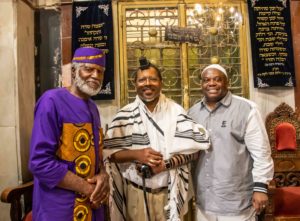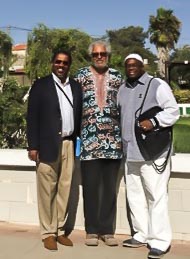Much of what people “think” they know about this community of Israelites that settled in Israel 50 years ago is incorrect or outdated. We visited them, met with their leaders, and conducted candid interviews that addressed our most pressing questions. They were welcoming and forthcoming. This article will inform and enlighten many.
A special debt of gratitude is owed to Rabbi Benyamin Levy who helped to facilitate my visit to Dimona; Sar Elyakeem Yehudah, who was my guide and comrade during my stay; Dr. David Israel, who arranged meetings and served as an excellent translator; Sar Ahamdiel Ben Yehudah for being so generous with his time and knowledge, Gaverit Ahmalyah who provided valuable insights and attended to my comfort at their guest house; and Gaverit Aturah Bahtel for creating such lovely attire for me and my wife. I am also grateful to Sar Ahdeev, Cohane Ben Kesed, Nasi Gavriel, and leaders of the Holy Council for entering into this meaningful dialog between our communities.
Chief Rabbi Capers Shmuel Funnye Jr., has been reaching out to our people all over the world. In recent years he has visited the Lemba in South Africa, the Abayudaya in Uganda, the Ibo in Nigeria, and the Ashanti in Ghana. He has met with world leaders from President Obama in the White House to Prime Minister Netanyahu in Israel. Being based in Chicago, Chief Rabbi Funnye and member of his congregation have known Ben Ammi, their founder, and leaders of the Kingdom of Yah (KOY)from its inception. I made this point in my formal presentation. There is much that our organization, the International Israelite Board of Rabbis, has admired about the KOY—particularly their healthy diet, inspirational music, and beautiful clothing. There have also been things that have troubled us and complicated our relationship until this point. I identified three primary areas of concern: (1) perceptions of messianic or even divine veneration of Ben Ammi, (2) the practice of polygamy, and the (3) the legality (or possible criminality) of actions taken in the name of individuals representing the KOY.

Upon my return, I was happy to report to Chief Rabbi Funnye that I investigated these matters thoroughly during my four days in Dimona. I asked these questions frequently and candidly to leaders and lay people alike. I received frank and honest responses. I was told that the KOY does not use the term “messiah” is its traditional Christian context. Instead, they use it in its original Hebrew sense, meaning “one anointed by God to lead Israel.” The enduring admiration they have for Ben Ammi is based on his vision, leadership, and accomplishments as a “man of God.” Their kohanim told me that they do not expect a “second coming” of Ben Ammi. They do not pray to Ben Ammi or even in his name. They invoke him as Jews invoke Abraham, Isaac, and Jacob.
I arrived under the misconception the member of the KOY rejected all traditions that are of a rabbinic or Judaic origin. I discovered that this is not true. Their leaders examine various traditions and incorporate those that they deem to be beneficial and harmonious with their understanding of the Torah. For example, they study the Torah using the rabbinic calendar. This was a revelation to me. I witnessed this myself on Shabbat morning in a study group led by Nasi Gavriel. They studied the parashot (Balak) in Hebrew and English much as we do with commentary and analysis by all participants—including women and children. However, they do refer to the law or teachings of Ben Ammi as a corollary to the laws of Moses. Therefore, the comparison to Moses is accurate while the comparison to Jesus is not according to the current teachings of the community.
I spoke with several Sarim and Nasim about the practice of polygamy. I was delighted to know that they do not practice “polygamy” as many articles and books have stated. They have a concept of “divine marriage,” which permitted some of the members to enter into plural relationships with consenting adults. Initially, they attempted to justify this practice based on Biblical precedents in Israelite history and the plight of black men who are incarcerated, addicted, or unable to be suitable husbands and fathers for Black women. They also pointed to the problems of infidelity in monogamous marriages. However, it was my interviews with female members of the community that revealed that the practice of divine marriage constitutes less than 20 percent of the current membership of the KOY. It is not required or even expected. Moreover, I learned that Ben Ammi made assurances to the Israeli government that young people from his community who joined the Israeli military would only practice monogamous marriage. While those who have been in “divine marriages” were not required to dissolve their relationships, the practice is clearly in sharp decline because of the stigma that it casts on their entire community. I stressed to their Holy Counsel that this practice defines their organization more than anything else. Moreover, I pointed out that it is the most negative perception that people have of all Hebrew Israelites that discourages them from joining our congregations—even those who have never permitted this custom. While I do not expect the KOY to repudiate the practice, I believe that they are capable of determining what the most significant threats to their survival are. They are intelligent people who understand politics as well as theology. If they conclude that divine marriage causes them to lose younger and more educated members; that its casts a stigma on their otherwise wholesome way of life; and that it creates insurmountable legal barriers for their full acceptance in the United States and in Israel, then I believe they are capable of adapting their traditions to meet their current needs.
In addition, we discussed their current legal status in the State of Israel. Many hold dual citizenship with the United States and Israel. Yet, even though they are Israeli citizens who serve in the military, they are not considered Jews. This is a serious problem for future growth because only Jews have a right to settle in Israel under the Law of Return. Therefore, if Israelites are recognized as Jews, then there will be no legal obstacle to Israelites immigrating to Israel and living and working anywhere in the country. This gives us a common goal and a shared mission to remove every reason by which the State of Israel might deny our Israelite status as Jews. I informed the KOY of our efforts to define what it means to be an Israelite so that it can be recognized as other Jewish denominations such as Orthodox, Conservative, and Reform. Many of their leaders expressed great enthusiasm about collaborating with us on this project.
I am most optimistic about our ability to work with the scholars, teachers, and cohanim of the KOY. While at the tomb of the patriarchs in Hebron, Sar Elyakeem davined fluently in Hebrew with me from an Orthodox prayer book. Our Ethiopian brothers presented our delegation with copies of their prayer book, written in Amharic. We, also, plan to produce an “Israelite Prayerbook” in the same manner with prayers that we write and passages of scripture that we select. Before my departure, they provided me with several musical CDs, which they produced from their studio in Dimona. They are talented and far advanced in this area of technology. They would be a tremendous assist in creating an “Israelite Hymnal.” In addition, many of them are fluent in Hebrew; they have lived in Israel for decades and even generations; they are anxious to collaborate with us to teach Black Jews throughout Africa and the United States about their Israelite heritage.
There was a spirit of brotherhood and shared destiny in everything we discussed. There was a tacit recognition that “mistakes were made” in the way they initially immigrated to Israel. And, they have severed ties with Prince Asiel and others who were formerly implicated in criminal activities. As the KOY forges a new chapter in its history, they desire to transcend many of the things that have kept our people divided. I strongly recommend that the Israelite Board of Rabbis continue this fruitful dialog through follow-up meetings and visits at every level. There is more that unites us than divides us. Together we can share in a brighter future for Jews of African descent.


We invite our readers to share their opinions and engage in constructive conversation. “May the words of my mouth and the meditation of my heart be acceptable to you, Lord, my rock and my Redeemer.” Pslam 19:14
Great and helpful information please come to Cincinnati ohio